Thomas James Richards, Diaries, Transcript Vol. 3, 26 January to 8 November 1916 - Part 17
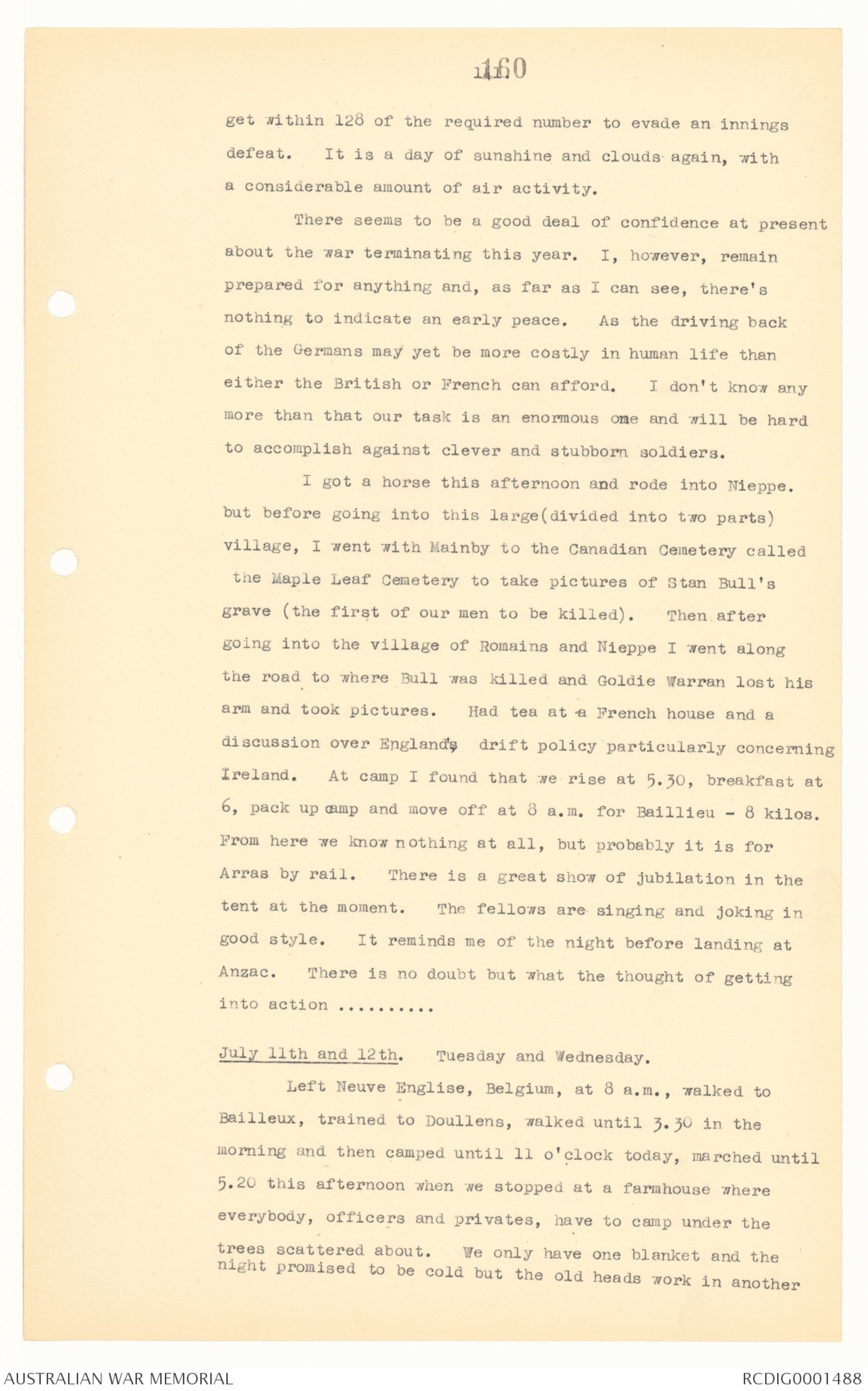
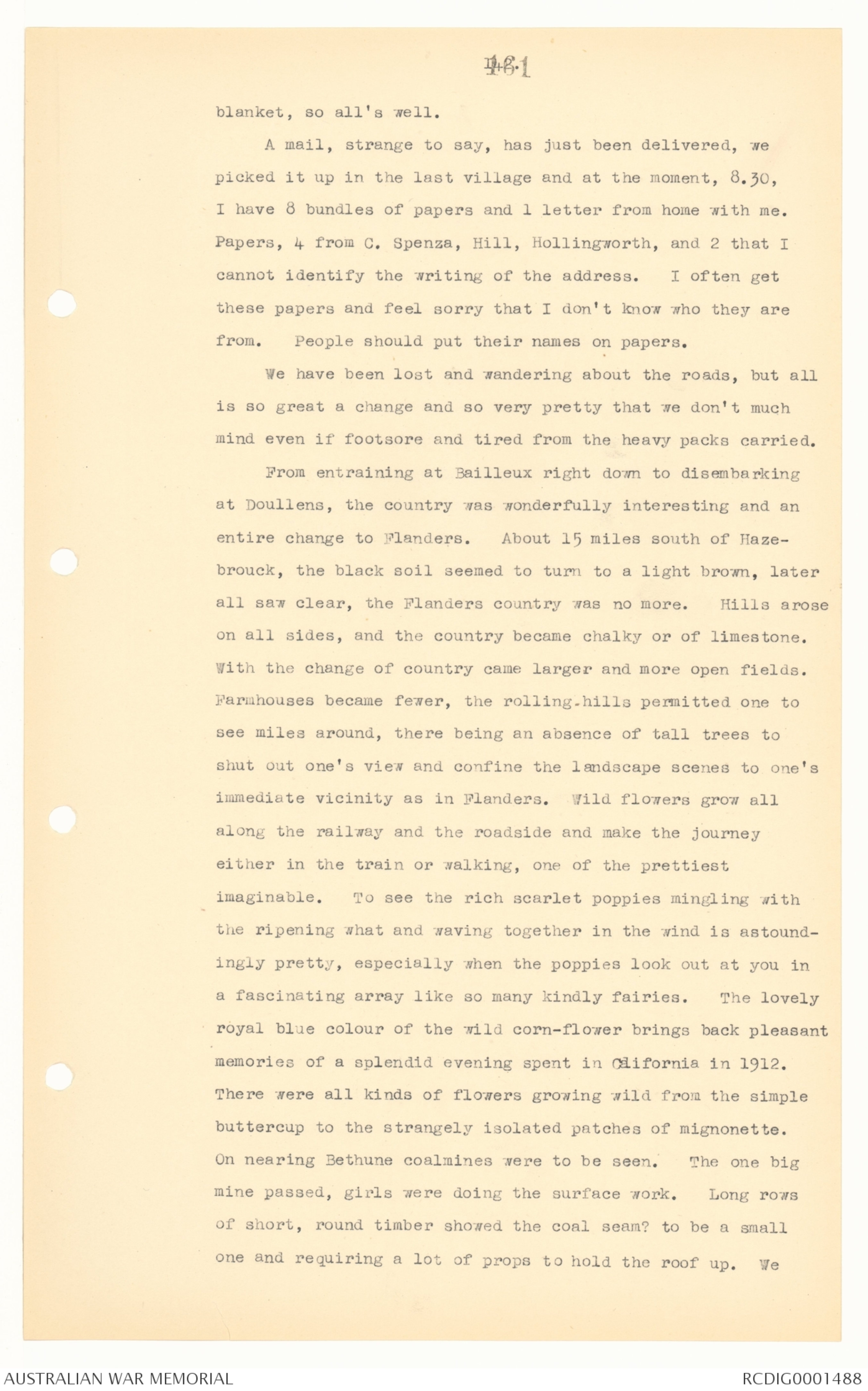
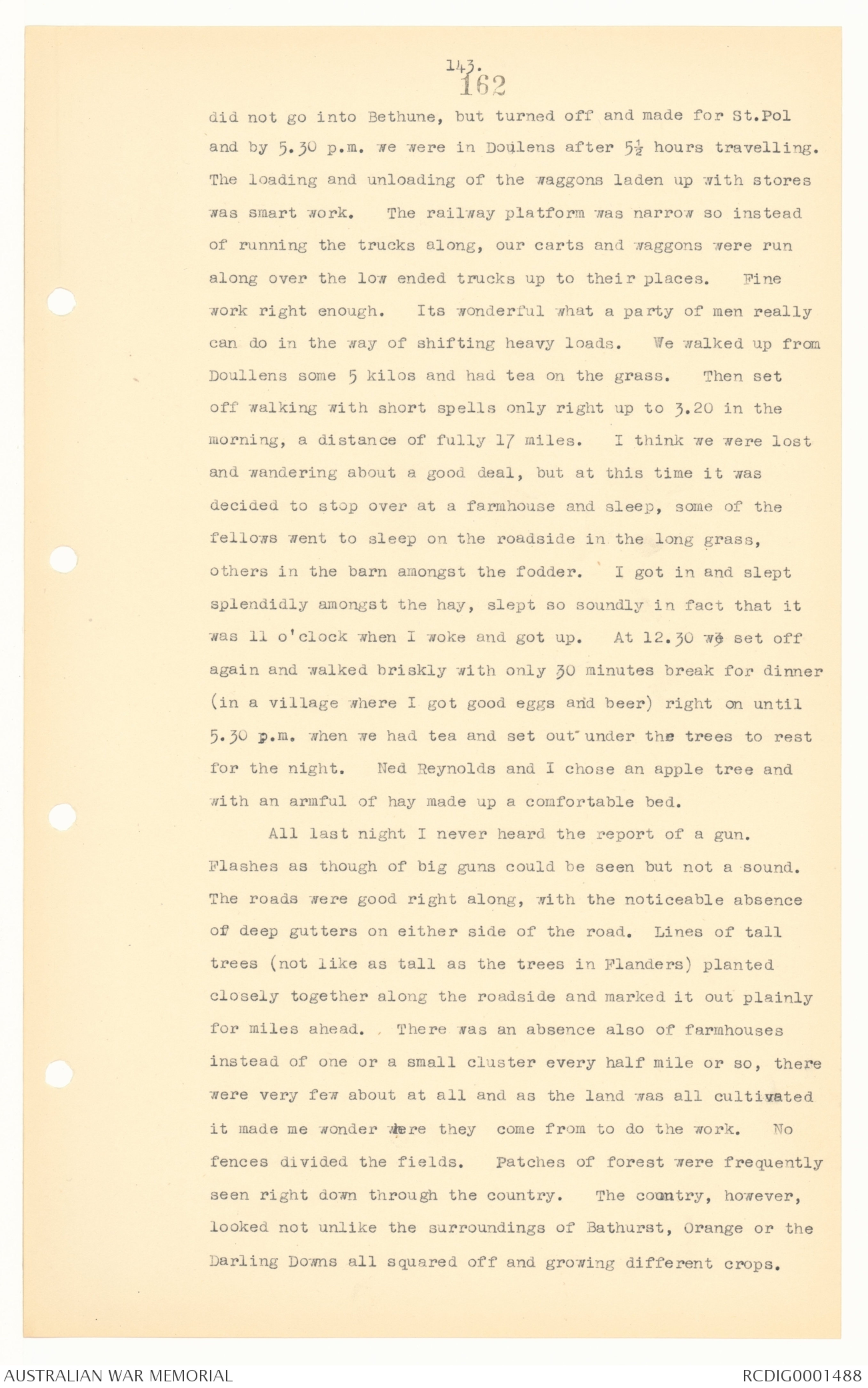

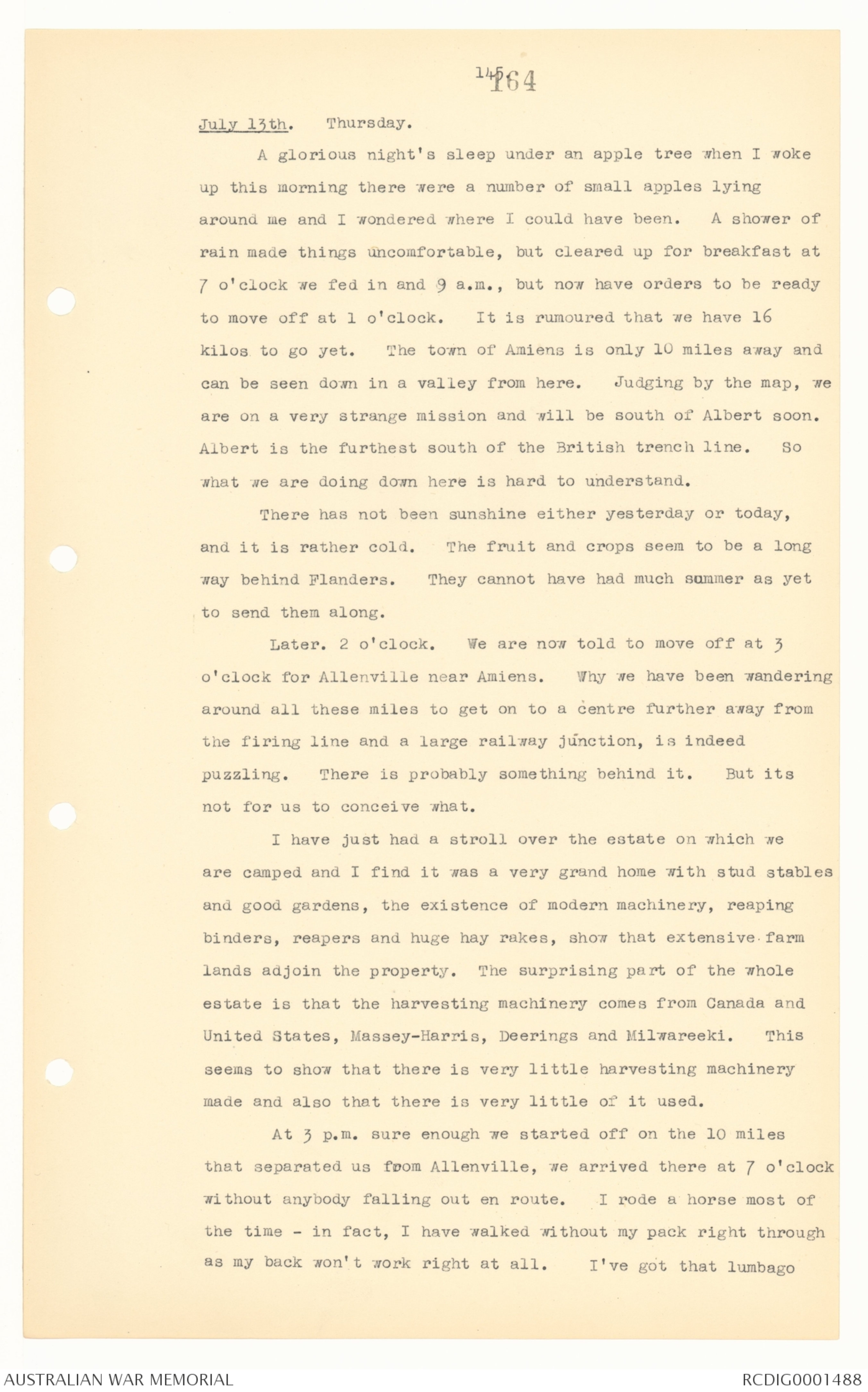
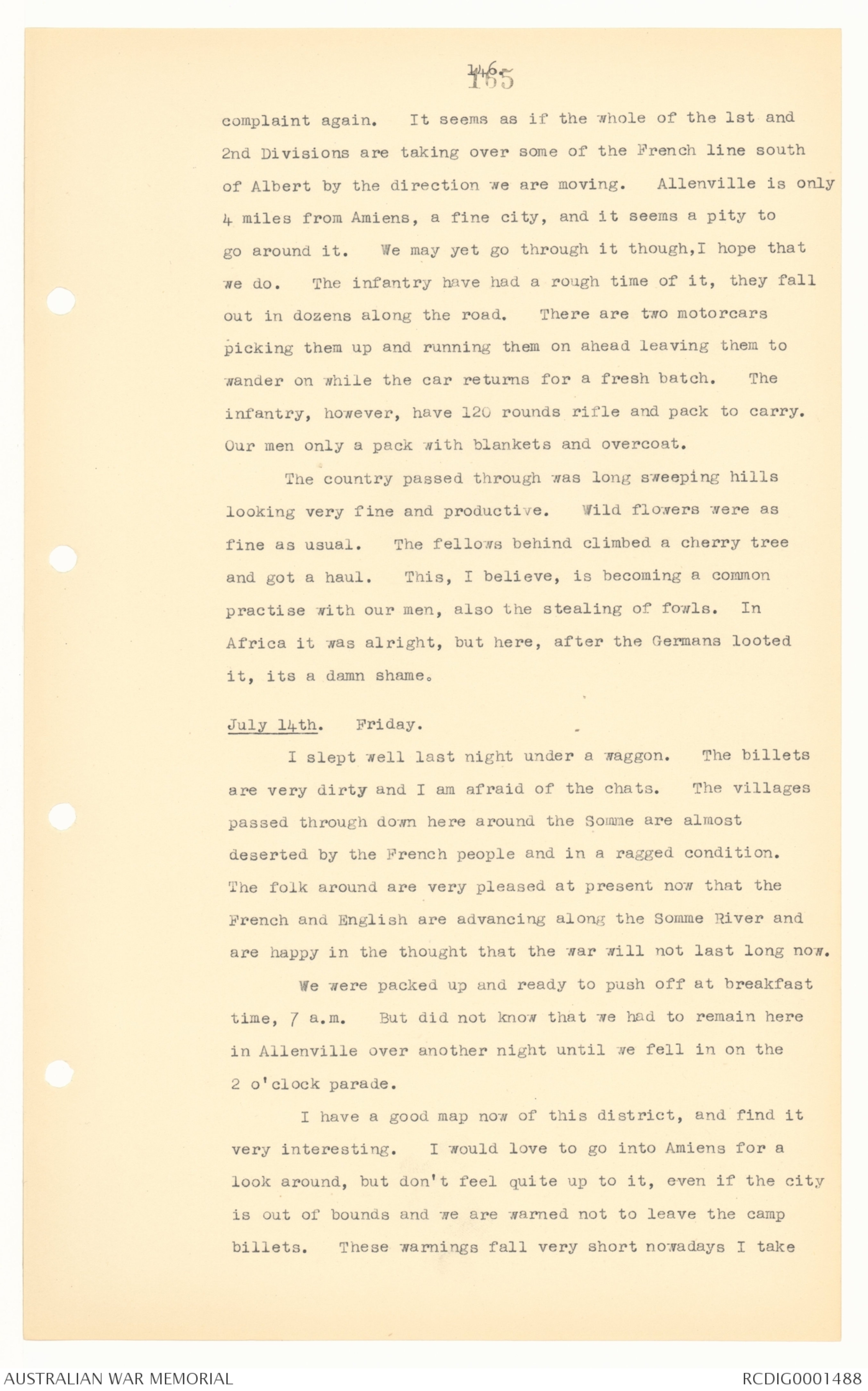
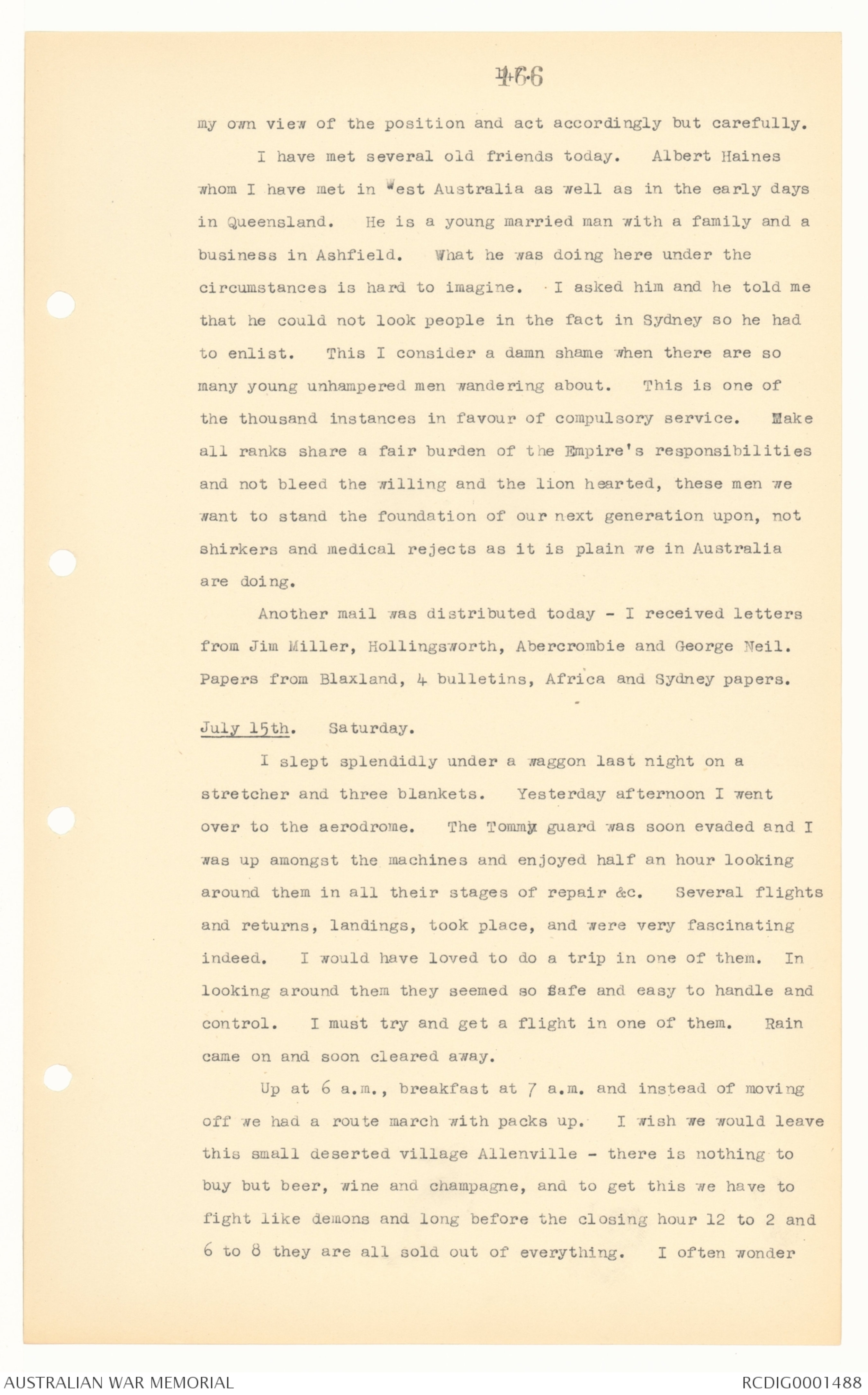
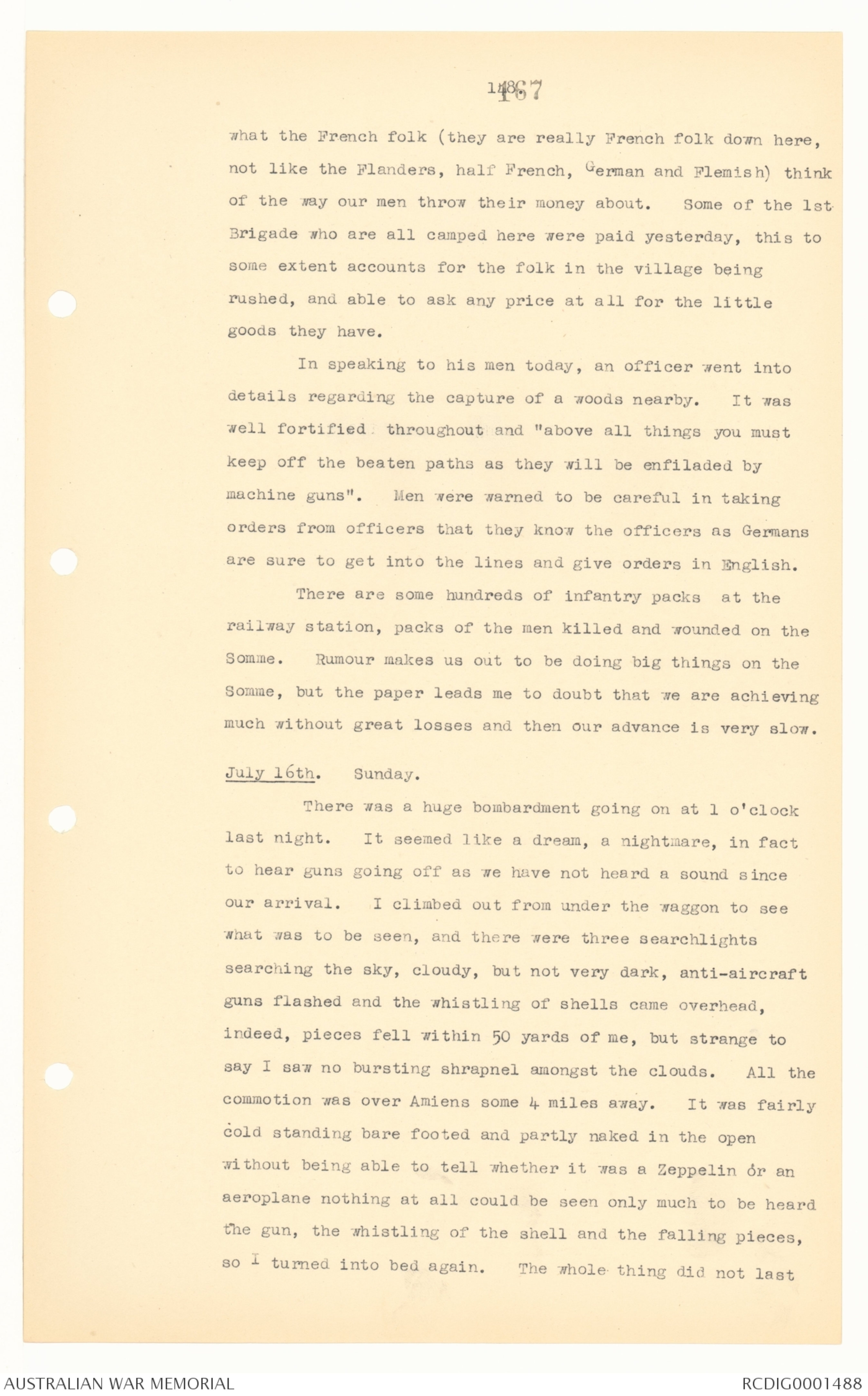
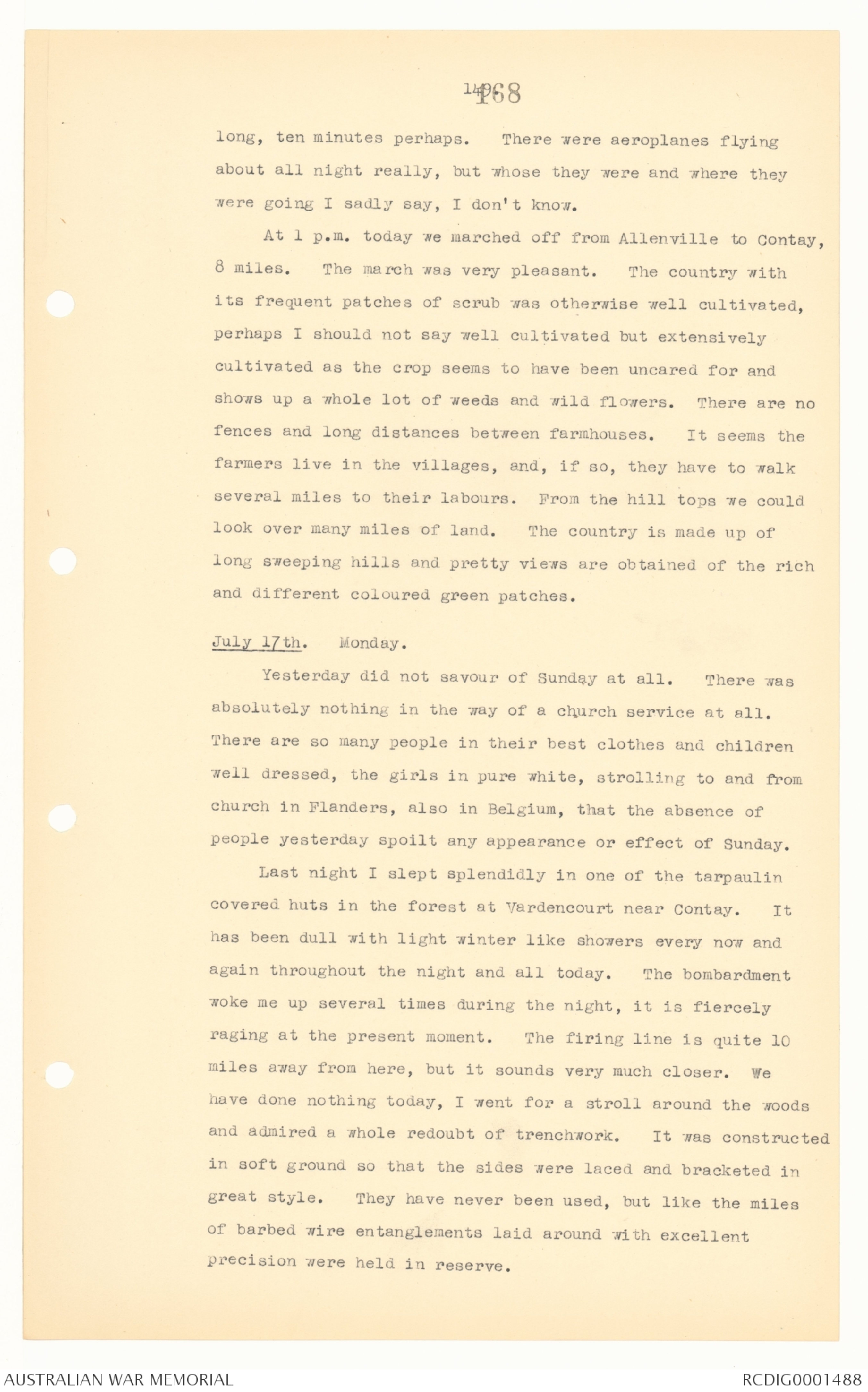
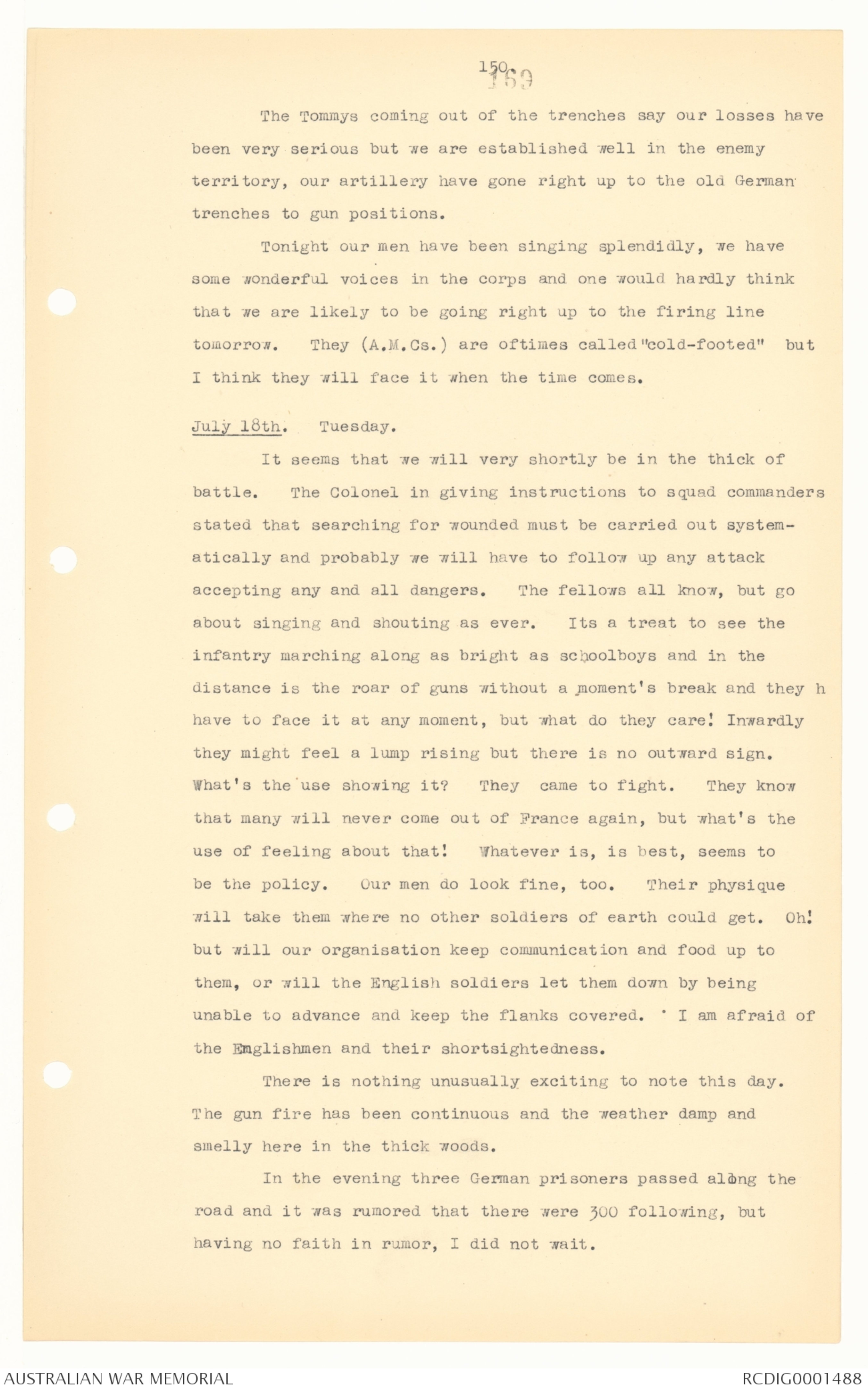
160
get within 128 of the required number to evade an innings
defeat. It is a day of sunshine and clouds again, with
a considerable amount of air activity.
There seems to be a good deal of confidence at present
about the war terminating this year. I, however, remain
prepared for anything and, as far as I can see, there's
nothing to indicate an early peace. As the driving back
of the Germans may yet be more costly in human life than
either the British or French can afford. I don't know any
more than that our task is an enormous ome and will be hard
to accomplish against clever and stubborn soldiers.
I got a horse this afternoon and rode into Nieppe.
but before going into this large(divided into two parts)
village, I went with Mainby to the Canadian Cemetery called
the Maple Leaf Cemetery to take pictures of Stan Bull's
grave (the first of our men to be killed). Then after
going into the village of Romains and Nieppe I went along
the road to where Bull was killed and Goldie Warran lost his
arm and took pictures. Had tea at aFrench house and a
discussion over Englands drift policy particularly concerning
Ireland. At camp I found that we rise at 5.30, breakfast at
6, pack up camp and move off at 8 a.m. for Baillieu - 8 kilos.
From here we know nothing at all, but probably it is for
Arras by rail. There is a great show of jubilation in the
tent at the moment. The fellows are singing and joking in
good style. It reminds me of the night before landing at
Anzac. There is no doubt but what the thought of getting
into action ... . . . . . . .
July 11th and 12th. Tuesday and Wednesday.
Left Neuve Englise, Belgium, at 8 a.m., walked to
Bailleux, trained to Doullens, walked until 3.30 in the
morning and then camped until 11 o'clock today, marched until
5.20 this afternoon when we stopped at a farmhouse where
everybody, officers and privates, have to camp under the
trees scattered about. We only have one blanket and the
night promised to be cold but the old heads work in another
146
blanket, so all's well.
A mail, strange to say, has just been delivered, we
picked it up in the last village and at the moment, 8.30,
I have 8 bundles of papers and I letter from home with me.
Papers, 4 from C. Spenza, Hill, Hollingworth, and 2 that I
cannot identify the writing of the address. I often get
these papers and feel sorry that I don't know who they are
from. People should put their names on papers.
We have been lost and wandering about the roads, but all
is so great a change and so very pretty that we don't much
mind even if footsore and tired from the heavy packs carried.
From entraining at Bailleux right down to disembarking
at Doullens, the country was wonderfully interesting and an
entire change to Flanders. About 15 miles south of Haze¬
brouck, the black soil seemed to turn to a light brown, later
all saw clear, the Flanders country was no more. Hills arose
on all sides, and the country became chalky or of limestone.
with the change of country came larger and more open fields.
Farmhouses became fewer, the rolling hills permitted one to
see miles around, there being an absence of tall trees to
shut out one's view and confine the landscape scenes to one's
immediate vicinity as in Flanders. Wild flowers grow all
along the railway and the roadside and make the journey
either in the train or walking, one of the prettiest
imaginable. To see the rich scarlet poppies mingling with
the ripening what and waving together in the wind is astound-
ingly pretty, especially when the poppies look out at you in
a fascinating array like so many kindly fairies. The lovely
royal blue colour of the wild corn-flower brings back pleasant
memories of a splendid evening spent in California in 1912.
There were all kinds of flowers growing wild from the simple
buttercup to the strangely isolated patches of mignonette.
On nearing Bethune coalmines were to be seen. The one big
mine passed, girls were doing the surface work. Long rows
of short, round timber showed the coal seam? to be a small
one and requiring a lot of props to hold the roof up. We
143.
162
did not go into Bethune, but turned off and made for St.Pol
and by 5.30 p.m. we were in Doulens after 5/ hours travelling.
The loading and unloading of the waggons laden up with stores
was smart work. The railway platform was narrow so instead
of running the trucks along, our carts and waggons were run
along over the low ended trucks up to their places. Fine
work right enough. Its wonderful what a party of men really
can do in the way of shifting heavy loads. We walked up from
Doullens some 5 kilos and had tea on the grass. Then set
off walking with short spells only right up to 3.20 in the
morning, a distance of fully 17 miles. I think we were lost
and wandering about a good deal, but at this time it was
decided to stop over at a farmhouse and sleep, some of the
fellows went to sleep on the roadside in the long grass,
others in the barn amongst the fodder. I got in and slept
splendidly amongst the hay, slept so soundly in fact that it
was 11 o'clock when I woke and got up. At 12.30 w2 set off
again and walked briskly with only 30 minutes break for dinner
(in a village where I got good eggs and beer) right on until
5. 30 p.m. when we had tea and set out under the trees to rest
for the night. Ned Reynolds and I chose an apple tree and
with an armful of hay made up a comfortable bed.
All last night I never heard the report of a gun.
Flashes as though of big guns could be seen but not a sound.
The roads were good right along, with the noticeable absence
of deep gutters on either side of the road. Lines of tall
trees (not like as tall as the trees in Flanders) planted
closely together along the roadside and marked it out plainly
for miles ahead. There was an absence also of farmhouses
instead of one or a small cluster every half mile or so, there
were very few about at all and as the land was all cultivated
it made me wonder were they, come from to do the work. No
fences divided the fields. Patches of forest were frequently
seen right down through the country. The country, however
looked not unlike the surroundings of Bathurst, Orange or the
Darling Downs all squared off and growing different crops.
183
Wheat, oats, potatoes, chiefly, the field though could not
have been well attended for weeds and wild flowers grew all
amongst the crops. In Flanders the what is grown closer
together and very well tended, the soil looks a whole lot
better too, up North. The villages down around here are
different to Flanders also. There are not nearly so many
religious emblems to be seen. A crucifix and a small altar
here and there, but no decoration inset in the walls of the
houses or is the mantlepiece or the walls covered with pottery
Gods and biblical pictures. The villages seem to be built
down in the hollows, most of them with a wide street in front
which have dams of water to give the horses a drink. Water
seems to me to be a bit of a trouble around this part of the
country. Here where we are now camped there is a dam, and
nearby a well some 160 ft. deep in which there is the best
water I have seen in France.
The well is round and built in with fairly large
boulders - the windlass is a large barrel 2 ft. 3 in diameter
with a cog wheel attachment which makes the work easy but very
slow. Around the top grew stinging nettles, every edge is
crowded out with it, one has always to be careful whether he
sits down or leans.
It is so strange to be moving about as we are and not
have the slightest knowledge as to where we are going or what
we are going to do. Yet the fellows don't seem to bother
and are very contented and patient. The point to which an
Australian will go to steal was demonstrated when the cooks saw
a big turkey on the roadside while we were marching along - he
at once got the ready assistance of others and formed a ring
around the turkey and slowly closed in. The turkey, however,
set up a dash and narrowly escaped. It was mean to attempt to
steal from the already impoverished peasants, and then what
would we have done with it, there was no place to cook it.
It was the sheer love of stealing that prompted the attempt,
and it can be seen going on every day. This military law makes
a thief of a man anyhow.
145
July 13th. Thursday.
A glorious night's sleep under an apple tree when I woke
up this morning there were a number of small apples lying
around me and I wondered where I could have been. A shower of
rain made things uncomfortable, but cleared up for breakfast at
/ o'clock we fed in and 9 a.m., but now have orders to be ready
to move off at 1 o'clock. It is rumoured that we have 16
kilos to go yet. The town of Amiens is only 10 miles away and
can be seen down in a valley from here. Judging by the map, we
are on a very strange mission and will be south of Albert soon.
Albert is the furthest south of the British trench line. So
what we are doing down here is hard to understand.
There has not been sunshine either yesterday or today,
and it is rather cold. The fruit and crops seem to be a long
way behind Flanders.
They cannot have had much sommer as yet
to send them along.
Later. 2 o'clock. We are now told to move off at 3
o'clock for Allenville near Amiens.
Why we have been wandering
around all these miles to get on to a centre further away from
the firing line and a large railway junction, is indeed
puzzling. There is probably something behind it. But its
not for us to conceive what.
I have just had a stroll over the estate on which we
are camped and I find it was a very grand home with stud stables
and good gardens, the existence of modern machinery, reaping
binders, reapers and huge hay rakes, show that extensive farm
lands adjoin the property. The surprising part of the whole
estate is that the harvesting machinery comes from Canada and
United States, Massey-Harris, Deerings and Milwareeki. This
seems to show that there is very little harvesting machinery
made and also that there is very little of it used.
At 3 p.m. sure enough we started off on the 10 miles
that separated us from Allenville, we arrived there at 7 o'clock
without anybody falling out en route. I rode a horse most of
the time - in fact, I have walked without my pack right through
as my back won't work right at all.
I've got that lumbago
165
It seems as if the whole of the lst and
complaint again.
2nd Divisions are taking over some of the French line south
of Albert by the direction we are moving. Allenville is only
A miles from Amiens, a fine city, and it seems a pity to
go around it. We may yet go through it though,I hope that
we do. The infantry have had a rough time of it, they fall
out in dozens along the road. There are two motorcars
picking them up and running them on ahead leaving them to
wander on while the car returns for a fresh batch. The
infantry, however, have 120 rounds rifle and pack to carry.
Our men only a pack with blankets and overcoat.
The country passed through was long sweeping hills
looking very fine and productive. Wild flowers were as
fine as usual. The fellows behind climbed a cherry tree
and got a haul. This, I believe, is becoming a common
practise with our men, also the stealing of fowls. In
Africa it was alright, but here, after the Germans looted
it, its a damn shame.
July l4th. Friday.
I slept well last night under a waggon. The billets
are very dirty and I am afraid of the chats. The villages
passed through down here around the Somme are almost
deserted by the French people and in a ragged condition.
The folk around are very pleased at present now that the
French and English are advancing along the Somme River and
are happy in the thought that the war will not last long now.
We were packed up and ready to push off at breakfast
time, / a.m. But did not know that we had to remain here
in Allenville over another night until we fell in on the
2 o'clock parade.
I have a good map now of this district, and find it
very interesting. I would love to go into Amiens for a
look around, but don't feel quite up to it, even if the city
is out of bounds and we are warned not to leave the camp
billets. These warnings fall very short nowadays I take
46
my own view of the position and act accordingly but carefully.
I have met several old friends today. Albert Haines
whom I have met in "est Australia as well as in the early days
in Queensland. He is a young married man with a family and a
business in Ashfield. What he was doing here under the
circumstances is hard to imagine. I asked him and he told me
that he could not look people in the fact in Sydney so he had
to enlist. This I consider a damn shame when there are so
This is one of many young unhampered men wandering about.
the thousand instances in favour of compulsory service. Make
all ranks share a fair burden of the Empire's responsibilities
and not bleed the willing and the lion hearted, these men we
want to stand the foundation of our next generation upon, not
shirkers and medical rejects as it is plain we in Australia
are doing.
Another mail was distributed today - I received letters
from Jim Miller, Hollingsworth, Abercrombie and George Neil.
Papers from Blaxland, A bulletins, Africa and Sydney papers.
July 15th. Saturday.
I slept splendidly under a waggon last night on a
stretcher and three blankets. Yesterday afternoon I went
over to the aerodrome. The Tommy guard was soon evaded and I
was up amongst the machines and enjoyed half an hour looking
around them in all their stages of repair àc. Several flights
and returns, landings, took place, and were very fascinating
indeed. I would have loved to do a trip in one of them. In
looking around them they seemed so Safe and easy to handle and
control. I must try and get a flight in one of them. Rain
came on and soon cleared away.
Up at 6 a.m., breakfast at / a.m. and instead of moving
off we had a route march with packs up. I wish we would leave
this small deserted village Allenville - there is nothing to
buy but beer, wine and champagne, and to get this we have to
fight like demons and long before the closing hour 12 to 2 and
6 to 8 they are all sold out of everything. I often wonder
O148
14857
what the French folk (they are really French folk down here,
not like the Flanders, half French, German and Flemish) think
of the way our men throw their money about. Some of the lst
Brigade who are all camped here were paid yesterday, this to
some extent accounts for the folk in the village being
rushed, and able to ask any price at all for the little
goods they have.
In speaking to his men today, an officer went into
details regarding the capture of a woods nearby. It was
well fortified throughout and "above all things you must
keep off the beaten paths as they will be enfiladed by
machine guns". Men were warned to be careful in taking
orders from officers that they know the officers as Germans
are sure to get into the lines and give orders in English.
There are some hundreds of infantry packs, at the
railway station, packs of the men killed and wounded on the
Somme. Rumour makes us out to be doing big things on the
Somme, but the paper leads me to doubt that we are achieving
much without great losses and then our advance is very slow.
July 16th. Sunday.
There was a huge bombardment going on at 1 o'clock
last night. It seemed like a dream, a nightmare, in fact
to hear guns going off as we have not heard a sound since
our arrival. I climbed out from under the waggon to see
what was to be seen, and there were three searchlights
searching the sky, cloudy, but not very dark, anti-aircraft
guns flashed and the whistling of shells came overhead,
indeed, pieces fell within 50 yards of me, but strange to
say I saw no bursting shrapnel amongst the clouds. All the
commotion was over Amiens some A miles away. It was fairly
cold standing bare footed and partly naked in the open
without being able to tell whether it was a Zeppelin or an
aeroplane nothing at all could be seen only much to be heard
the gun, the whistling of the shell and the falling pieces,
so 1 turned into bed again. The whole thing did not last
14968
long, ten minutes perhaps. There were aeroplanes flying
about all night really, but whose they were and where they
were going I sadly say, I don't know.
At 1 p.m. today we marched off from Allenville to Contay,
8 miles. The march was very pleasant. The country with
its frequent patches of scrub was otherwise well cultivated,
perhaps I should not say well cultivated but extensively
cultivated as the crop seems to have been uncared for and
shows up a whole lot of weeds and wild flowers. There are no
fences and long distances between farmhouses. It seems the
farmers live in the villages, and, if so, they have to walk
several miles to their labours. From the hill tops we could
The country is made up of
look over many miles of land.
long sweeping hills and pretty views are obtained of the rich
and different coloured green patches.
July 17th. Monday.
Yesterday did not savour of Sunday at all. There was
absolutely nothing in the way of a church service at all.
There are so many people in their best clothes and children
well dressed, the girls in pure white, strolling to and from
church in Flanders, also in Belgium, that the absence of
people yesterday spoilt any appearance or effect of Sunday.
Last night I slept splendidly in one of the tarpaulin
covered huts in the forest at Vardencourt near Contay. It
has been dull with light winter like showers every now and
again throughout the night and all today. The bombardment
woke me up several times during the night, it is fiercely
raging at the present moment. The firing line is quite 10
miles away from here, but it sounds very much closer. We
have done nothing today, I went for a stroll around the woods
and admired a whole redoubt of trenchwork. It was constructed
in soft ground so that the sides were laced and bracketed in
great style. They have never been used, but like the miles
of barbed wire entanglements laid around with excellent
precision were held in reserve.
1995
The Tommys coming out of the trenches say our losses have
been very serious but we are established well in the enemy
territory, our artillery have gone right up to the old German
trenches to gun positions.
Tonight our men have been singing splendidly, we have
some wonderful voices in the corps and one would hardly think
that we are likely to be going right up to the firing line
tomorrow. They (A.M.Cs.) are oftimes called"cold-footed" but
I think they will face it when the time comes.
July 18th. Tuesday.
It seems that we will very shortly be in the thick of
battle. The Colonel in giving instructions to squad commanders
stated that searching for wounded must be carried out system-
atically and probably we will have to follow up any attack
accepting any and all dangers. The fellows all know, but go
about singing and shouting as ever. Its a treat to see the
infantry marching along as bright as schoolboys and in the
distance is the roar of guns without a moment's break and they
have to face it at any moment, but what do they care! Inwardly
they might feel a lump rising but there is no outward sign.
What's the use showing it? They, came to fight. They know
that many will never come out of France again, but what's the
use of feeling about that! Whatever is, is best, seems to
be the policy. Our men do look fine, too. Their physique
will take them where no other soldiers of earth could get. Oh!
but will our organisation keep communication and food up to
them, or will the English soldiers let them down by being
unable to advance and keep the flanks covered. I am afraid of
the Emglishmen and their shortsightedness.
There is nothing unusually exciting to note this day.
The gun fire has been continuous and the weather damp and
smelly here in the thick woods.
In the evening three German prisoners passed aling the
road and it was rumored that there were 300 following, but
having no faith in rumor, I did not wait.
 Sam scott
Sam scottThis transcription item is now locked to you for editing. To release the lock either Save your changes or Cancel.
This lock will be automatically released after 60 minutes of inactivity.